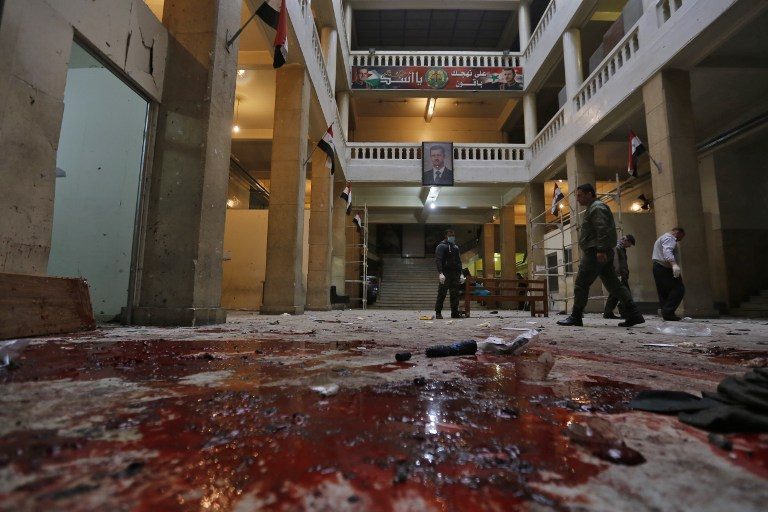SUMMARY
This is AI generated summarization, which may have errors. For context, always refer to the full article.

DAMASCUS, Syria (3rd UPDATE) – Two suicide bombings hit the Syrian capital Damascus on Wednesday, March 15, including an attack at a central courthouse that killed at least 32 people, as the country’s war entered its seventh year.
In northern Syria, 14 children were among 25 people killed in an air strike on Idlib city, a monitor said.
There was no immediate claim of responsibility for the blasts, the second wave of deadly attacks in the capital in less than a week, after twin bombings Saturday, March 11, that killed 74 people.
The powerful rebel Ahrar al-Sham group issued a rare statement condemning “in the strongest terms” Wednesday’s “criminal terrorist blasts.”
The first attack saw a suicide bomber rush inside the building and blow himself up when police tried to prevent him from entering the courthouse in the centre of Damascus, state media reported.
A police source told Agence France-Presse that 32 people were killed and 100 wounded.
“I heard a commotion and looked to my left and I saw a man in a military vest,” a man with a bandage over his eye told state television after the attack.
“He had his hands up and screamed ‘God is greatest’ and then the blast happened,” he added.
State television broadcast images from inside the courthouse, showing blood splattered across the ceiling and smeared across the marble floor of the lobby, with a portrait of President Bashar al-Assad still intact and hanging above.
Streets deserted
The second blast hit a restaurant in the city’s western Rabweh district less than two hours later, and injured 25 people, the police source said.
Elsewhere, 25 people including 14 children were killed in an air strike in Idlib city in northwestern Syria, according to the Syrian Observatory for Human Rights.
More than 320,000 people have been killed in Syria since the conflict began in March 2011, with Assad’s government now holding the upper hand in the bloody war and rebel forces increasingly divided and dispirited.
In recent months, the opposition has suffered a series of reversals, including being forced from their one-time stronghold of east Aleppo in December.
And peace talks have made little progress towards resolving the conflict, with rebels declining to even attend a latest round of negotiations in Kazakhstan which wrapped up Wednesday.
The conflict began in 2011 with peaceful demonstrations inspired by similar movements during the so-called “Arab Spring”, calling on Assad to implement reforms, but swiftly spiraled into a complex, multi-front bloodbath.
More US troops planned
Rebel forces initially captured large parts of the country and several key cities, and won support from international backers including Washington, Turkey and the Gulf states.
But the Islamic State (ISIS) jihadist group emerged from the chaos to seize control of significant territory in Syria and neighboring Iraq.
In September 2015, government ally Russia began a military intervention in support of Assad, helping his forces regain much of the ground they had lost.
Russian-backed regime forces, a US-backed Arab-Kurdish alliance and Turkish troops with allied rebels have all squeezed northern Syrian territory from the jihadists.
A US defense official told Agence France-Presse on Wednesday that up to 1,000 additional American troops could deploy to northern Syria under provisional Pentagon plans.
There are currently likely between 800 to 900 US personnel on the ground aiding the push for the ISIS bastion of Raqa, and the official said the new scheme could allow for up to 1,000 more.
“That’s one of the proposals that’s on the table for discussion,” the official said, speaking on condition of anonymity.
‘Savage horror’
On Wednesday, Aleppo residents said water was gradually being restored after months of cuts after ISIS was expelled from a local pumping station by a government offensive.
State television said one of its cameramen, Ali Suleiman, was killed when its team in east Aleppo province was “targeted by Daesh terrorists,” using an Arabic acronym for ISIS, without giving further details.
The war’s brutality has provoked international outcry, with the UN’s rights chief Zeid Ra’ad Al Hussein this week describing Syria as “a place of savage horror and absolute injustice”.
UN Secretary General Antonio Guterres on Wednesday urged adherence to a ceasefire brokered by Russia and Turkey in December, and progress towards peace, which he called “a moral and political imperative both for the Syrian people and for the world”.
Peace is something that ordinary Syrians, including many who supported the uprising, are desperate for.
“When we began to demonstrate, I never thought it would come to this. We thought it would end in two, three months, a year at most,” Abdallah al-Hussein, a 32-year-old footballer from the town of Saraqeb in Idlib province, told Agence France-Presse.
“Whether this war is ended with weapons or peacefully doesn’t matter. People want to live in peace.” – Rappler.com
Add a comment
How does this make you feel?
There are no comments yet. Add your comment to start the conversation.